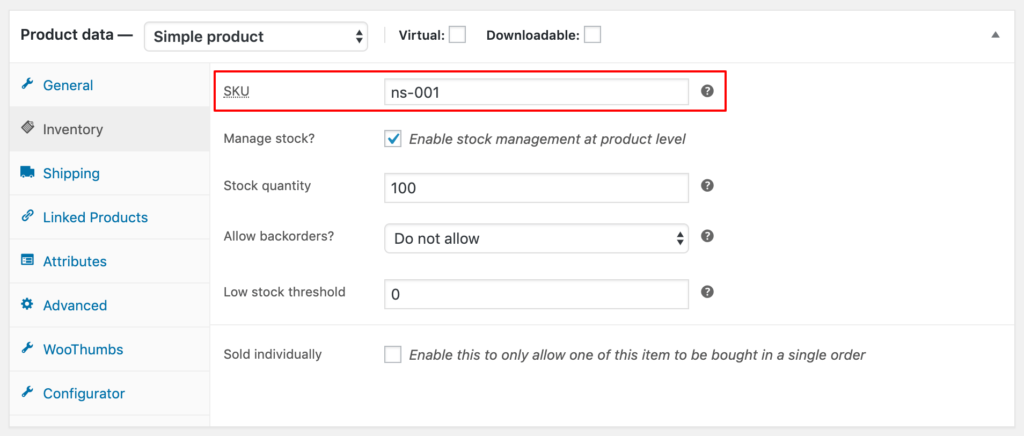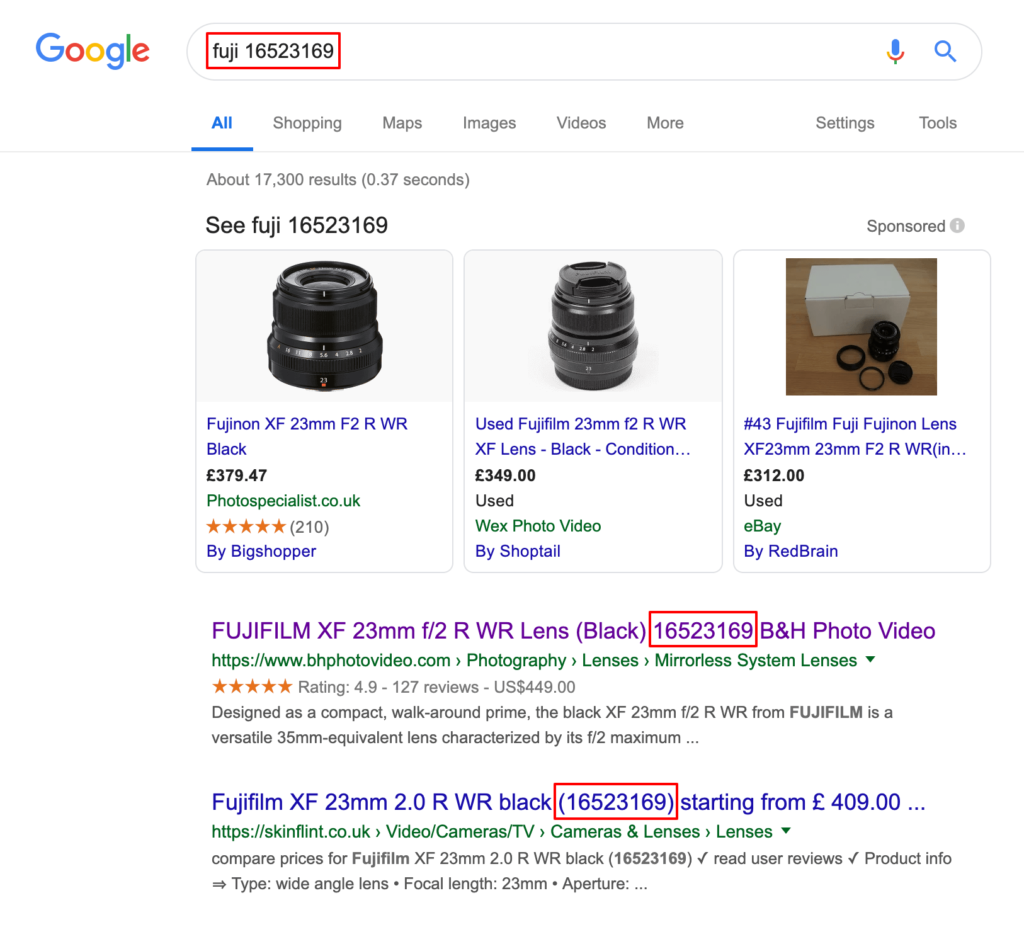If you have a WooCommerce store, then you’ve almost certainly come across SKUs, but what is a SKU number? In short, they’re that number/letter combination you stick in the product data section of your product page.

You’ve probably also heard about the wide variety of reasons for why you should or shouldn’t use them in your store. All of this can get pretty confusing, so in this article, we’ve broken everything down for you including:
- The benefits of using an SKU number.
- How to add SKU’s to the WooCommerce search.
- What the difference is between an SKU and an UPC
What is a SKU number?
SKU stands for stock-keeping unit. Simply put, it’s a combination of letters and numbers that reflect the characteristics of that product.
The SKU of a product will either be created by the manufacturer (if you’re re-selling) or by you (if you’ve created the product). A product may change its name over time, but it’s SKU should remain constant.
Here’s an example: ICWP-PL-WSSV
This SKU describes the IconicWP plugin WooCommerce Show Single Variations.
There’s also another type of product code call a UPC (Universal Product Code).
What’s the Difference Between a SKU and a UPC?
An SKU is made up by a company-specific to their needs and is unique to their stock system, whereas a UPC is as the name would suggest a universal product identifier.
For example, if you’re looking at product packaging where you see the number under the barcode, that is the UPC. And then an SKU may be seen on a shelf edge ticket.
Both retail stores and e-commerce stores use SKUs as part of their inventory management systems. The largest example of this is Amazon.
In short, SKUs are unique to a company and can be a random mix of alphanumeric characters. Whereas as a UPC is universal.
5 Reasons To Use Product SKUs
An SKU is often used for inventory tracking, but the little-known advantages of using SKUs in your store are vast and varied. So, we’ve narrowed it down to our favourite five. Plus, if you stick with us, we have a little bonus just for you in the latter part of this article.
Reason 1: They increase your visibility in Google
We all know that getting your products to show up in Google search results is critical to increasing sales. You can increase the likelihood of your product appearing in more search results by adding SKUs to your online store.
[click_to_tweet tweet=”Getting your #WooCommerce products to show up in Google search results is critical to increasing sales…” quote=”Getting your products to show up in Google search results is critical to increasing sales…”]
When potential customers search for a specific product on Google (especially if you’re a reseller), all of these same products will be lumped together according to certain metadata. Within this, is the SKU code. If your product SKU matches up with the other products in the list, it’s more likely to appear in the result.

Our top tip: Work on acquiring good product reviews to push your product listing up above the other stores selling the same product.
Reason 2: It’s quicker for repeat customers
If you have a lot of products in your store then it may well be pretty difficult for a customer to find a product they purchased previously, and want to buy again.
They could type in the search bar, the name or a vague description of the product. This may take time though and be frustrating to get to the end result. By providing an SKU number in their order email, they can simply copy and paste it into the search bar and find the product with ease.
This is also useful if you change the name or description of your product in the future. Your SKU will always remain the same, so the product can be easily found.
Reason 3: It speeds up support
If you’ve ever dealt with returns, enquiries, or disputes over your products then you’ll know how long these discussions can take if you don’t have the right information.
By requesting the SKU of a product (which should be found on the product page or order email), you can easily find all the information you need on that specific product.
Our top tip: To make the most out of SKUs, include custom SKUs for each product variation (size, colour, weight etc) so that you can find the exact product every time.
Reason 4: You’ll need them for reselling
If you’re planning on selling your products wholesale, or on other stores, then you’ll need SKUs to make your life easier.
Many larger stores use SKUs to tell apart their huge stocklist. If your products are amongst them, then you will need to provide detailed, unique SKUs so they don’t get lost in a sea of other white t-shirts, or blue pillowcases.
As a bonus, say a vendor needs to look up some extra information on your product for their site. They can simply paste the SKU into your search bar and find the information they need. This will save you from answering endless emails full of vendor queries.
Our top tip: Even if you aren’t planning on reselling your products yet, it’s a good idea to put good SKUs in place now. You’ll save yourself a lot of time later.
Reason 5: Keep your inventory organised
Because SKUs are used to track product traits and variations, they can be used to keep an accurate account of your inventory overall.
By using SKUs in this way, you can keep an eye on products with similar names and variations. Making sure that each product never goes out of stock – especially if it’s popular.
The added bonus of tracking your SKUs instead of product names is that it saves you time. By ordering, searching and tracking through SKUs, you can make light work of stock management.
How to Add SKUs to WooCommerce Search
We’ve mentioned searching for SKUs a few times throughout this article. However, the default product search is quite basic in WooCommerce. Unless you’re using a plugin like SearchWP to enhance the product search, your customers may not be finding the products they want.
One simple tweak you can make is to add the product SKU as a field that’s included when customers use your search bar.
[click_to_tweet tweet=”One simple tweak lets you search #WooCommerce products by SKU” quote=”One simple tweak lets you search WooCommerce products by SKU”]
I’ve prepared a sample plugin for you to enable this. Once downloaded, simply install the zip as you would a normal plugin.
[content_upgrade id=”906047″ title=”Your Free Plugin Download” content=”Simply enter your name and email to receive a simple plugin to enable searching products by SKU.”]
The Cons of Adding SKUs to WooCommerce Search
Although there are clear benefits to adding SKUs to WooCommerce search, there is also a pitfall.
If your site has a lot of product metadata (product data, custom fields you’ve created, etc), then your product search could become slow.
Products are primarily stored in two database tables in your WooCommerce site; ‘posts’ and ‘postmeta’. This is also where Posts, Pages, and any other post types are stored. As you can imagine, these tables can contain a lot of data. So adding more to it can slow it down.
To combat this, a system such as ElasticPress could be the solution.
ElasticPress will create its own optimised tables for searching and indexing, which avoid the unnecessary rows of the ‘posts’ and ‘postmeta’ tables. Problem solved.
Search For Individual Variations by SKU
If your store offers variable products with many variations, then you might want to take a look at our WooCommerce Show Single Variations plugin.
This is a very versatile plugin which will allow you to reveal individual product variations in the shop, filtered, and search result pages of your WooCommerce store.
[alert title=”Start your 14-day free trial” background-color=”#D92830″ color=”#FFFFFF” content=”There’s nothing to lose. You can start your free trial right now and instantly put your product variations in front of your customers.” button-text=”Get Free Trial” link=”/products/woocommerce-show-single-variations/?utm_source=product-skus&utm_medium=blog-post”]
Once installed, you can choose specific variations to appear in your search results. Now when customers search for full or partial SKUs on their store, they are presented with all product options which can then be filtered further. This is a much better experience for them than seeing one parent variable product with a generic image.
The customer can then add these products to their cart right from the search results page.
Conclusion
Now you understand what a SKU number is and the difference between an SKU and a UPC, you’ll be better prepared to manage the inventory of your ecommerce company.
How are you planning on using your newfound SKU knowledge? Leave your plans in the comments below.
